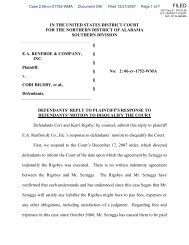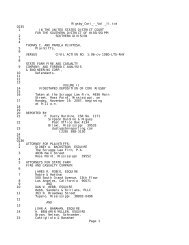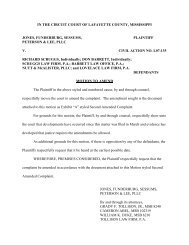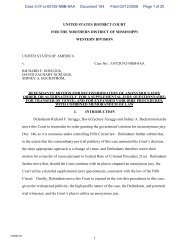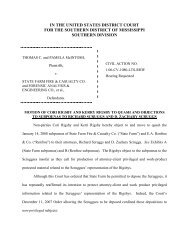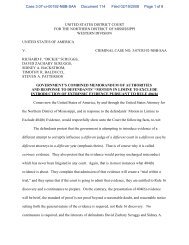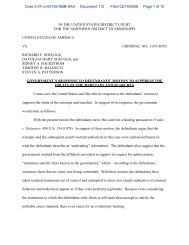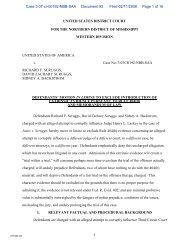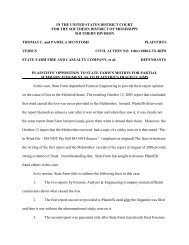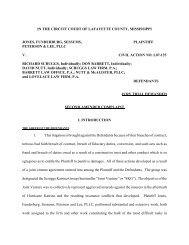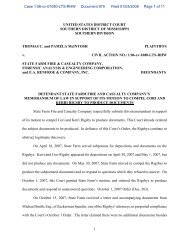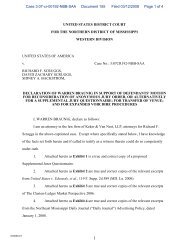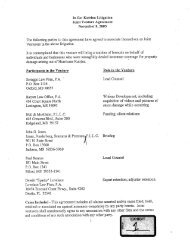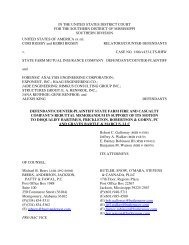this pdf of the State Farm trial brief - Insurance Coverage Blog
this pdf of the State Farm trial brief - Insurance Coverage Blog
this pdf of the State Farm trial brief - Insurance Coverage Blog
Create successful ePaper yourself
Turn your PDF publications into a flip-book with our unique Google optimized e-Paper software.
Case 1:06-cv-00055-RHW Document 77-1 Filed 03/02/2007 Page 6 <strong>of</strong> 17<br />
127 S. Ct. 1057, 1063 (2007) (due process "forbids a <strong>State</strong> to use a punitive damages award to<br />
punish a defendant for injury that it inflicts upon nonparties"). Moreover, claims handling based<br />
upon use <strong>of</strong> <strong>the</strong> protocol is not similar conduct to claims handling without <strong>the</strong> protocol. Thus,<br />
<strong>the</strong> protocol is not relevant to showing <strong>the</strong> degree <strong>of</strong> reprehensibility in <strong>the</strong> conduct alleged in<br />
<strong>this</strong> case.<br />
See <strong>State</strong> <strong>Farm</strong> Mut. Auto. Ins. Co. v. Campbell, 538 U.S. 408, 422 (2003) ("A<br />
defendant's dissimilar acts, independent from <strong>the</strong> acts upon which liability was premised, may<br />
not serve as <strong>the</strong> basis for punitive damages.").<br />
C. The Wind/Water Claims Handling Protocol Is Not Evidence <strong>of</strong> Bad Faith or<br />
O<strong>the</strong>r Culpable Conduct Meriting Punitive Damages<br />
In Broussard v. <strong>State</strong> <strong>Farm</strong> Fire and Casualty Co., No. 1:06cv6-LTS-RHW, <strong>the</strong> Court<br />
erroneously found a basis for punitive damages in <strong>the</strong> protocol, which, in <strong>the</strong> Court's view,<br />
"emphasized <strong>the</strong> exclusion but is at odds with o<strong>the</strong>r express terms <strong>of</strong> <strong>the</strong> insurance contract";<br />
"attempted impermissibly to place <strong>the</strong> burden <strong>of</strong> pro<strong>of</strong> on <strong>the</strong> Plaintiffs to establish that <strong>the</strong>ir<br />
losses were caused by wind" and "in slab cases, . . . assigned 100% <strong>of</strong> <strong>the</strong> loss to flooding unless<br />
<strong>the</strong> policyholder could show 'independent windstorm damage' or produce an eyewitness to <strong>the</strong><br />
destruction." See Broussard, Order [Broussard 108], p. 2. In fact, <strong>the</strong> protocol reasonably<br />
interpreted <strong>the</strong> anti-concurrent cause language <strong>of</strong> <strong>the</strong> policy, which excludes damage that "would<br />
not have occurred in <strong>the</strong> absence <strong>of</strong>" excluded water damage, as limiting coverage in storm surge<br />
cases to "independent windstorm damage." Ex. A at 2. The fact that <strong>the</strong> Court later invalidated<br />
<strong>State</strong> <strong>Farm</strong>'s anti-concurrent cause language (which had been upheld and applied by Mississippi<br />
state and federal courts 1 ) does not transform <strong>State</strong> <strong>Farm</strong>'s attempt to implement that contractual<br />
1<br />
See Boteler v. <strong>State</strong> <strong>Farm</strong> Cas. Ins. Co., 876 So. 2d 1067, 1069-70 (Miss. Ct. App. 2004) (<strong>State</strong> <strong>Farm</strong>'s anticoncurrent<br />
cause lead-in language is "clear" and "[u]nambiguous language <strong>of</strong> exclusion"); Rhoden v. <strong>State</strong> <strong>Farm</strong><br />
Fire & Cas. Co., 32 F. Supp. 2d 907, 911-13 (S.D. Miss. 1998) (Mississippi law), aff'd, 200 F.3d 815 (5th Cir.<br />
1999); Wallace v. City <strong>of</strong> Jackson, No. 251-05-941 CIV, slip op. at 3 (Hinds County Cir. Ct. Miss. Sept. 15,<br />
2006) (<strong>State</strong> <strong>Farm</strong>'s lead-in language has been "judicially determined to be clear and unambiguous").<br />
4



